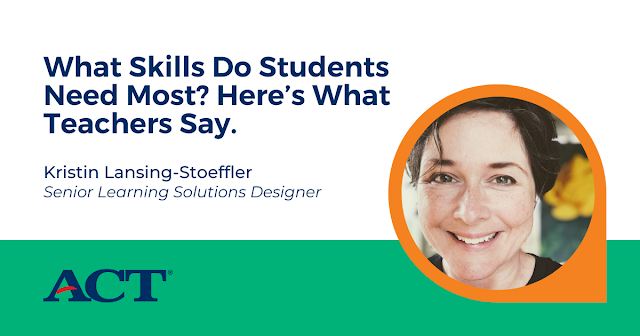This National Teacher Appreciation Week, May 8-12, ACT recognizes the profound efforts of teachers to help students succeed during challenging times. Year after year, teachers navigate evolving contents and standards, and they engage with students in an environment that’s constantly evolving because of the pandemic.
Through what they teach, teachers ensure that students learn core content such as math and science. Through how they teach, teachers also cultivate students’ ability to think creatively and critically, keep up with advancing technologies, work collaboratively, and better understand themselves as learners. Recent ACT research shows how teachers are going above and beyond to empower students with all the skills they need to succeed.
Skills that extend beyond core contents are embedded in both the “what” and the “how” of teaching. At ACT, we refer to these skills as cross-cutting capabilities – transferrable skills that cut across contents, activities, and assessments. Cross-cutting capabilities include critical thinking, creative thinking and innovation, collaborative problem solving, self-directed learning, and information and communication technology skills.
Just how important are these skills for student success in the classroom? To find out, we asked more than 2,300 K-12 teachers from public and private schools across the country to rank skills they consider to be requirements for student success in the classroom.
The results were striking. Critical thinking – the skills required to think critically about ideas and information to make a decision, determination, or judgement – was considered the most-required skill for student success in the classroom, above even content knowledge, with 86% of teachers ranking it in the top half of the required skills. Collaboration skills – the ability to work effectively as a team toward a common goal – were ranked third, behind content knowledge such as English and language arts. Creative thinking and innovation skills – the ability to generate ideas that are innovative or unconventional – also ranked highly as required for student success. Same goes for self-directed learning skills, or the ability to learn new information or skills independently, and technology skills, which are required to acquire and apply information using technology.
Top Six Skills Required for Success in the Classroom, According to Teachers
The importance of these findings extends from the classroom to the board room. The same skills that teachers say are required for school success have also been identified as required for success in education and the workplace by global groups, such as the World Economic Forum and the Organization for Economic Cooperation and Development. These groups share a common mission to empower students around the globe with the ”future skills” that will be required to compete in an international economy.
Despite the importance of cross-cutting skills and their role in classroom activities and student assessments, they are not often explicitly included in measurement, meaning students do not receive insights about their proficiency or progress with these skills. For that reason, teachers rarely receive credit for developing cross-cutting skills in students, and may not receive sufficient support for integrating these skills into classroom instruction.
This oversight affects students as well. For example, a science teacher might assign students to work with a group to use technology to research a topic and then create a presentation or build a website to share their insights with the class. If a student gets a low grade on this project, it will most likely be interpreted as an indication that they are struggling in science when, in fact, it may be that they are struggling with the social skills required to collaborate with their classmates, the critical thinking and technology skills required for research, the creative thinking and technology skills required to create the presentation, or the self-directed learning skills required to complete a task with many parts.
These challenges point to an opportunity to #ThankATeacher and provide our full appreciation, support, and credit for all the skills they teach and develop in the classroom to help every student reach their potential.

